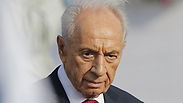
'Let's hope that the next president, like Peres, is elected for lack of any other option'
צילום: AFP
Why Israel needs a president
Op-ed: A country which sees itself as part of the family of nations has to have at least one figure to represent it in the world according to the acceptable diplomatic standards.
Once every seven years a president is elected, and that is also more or less the time when we start wondering if the State of Israel even needs a president. If we examine the need from an economic perspective, the answer appears to be clear: There is no need for a president.
A president is a ceremonial figure which costs the State's coffers quite a lot of money. The prime minister can handle state dinners and trips to funerals abroad, or send his wife. And so, if the prime minister becomes the head of state, we will reduce costs and ceremonies. Two State Cup games, soccer and basketball, about three hours each, will regretfully be erased from the itinerary, and the letters of credence that foreign ambassadors submit every two months will be submitted on Saturday evening, or during the prime minister's free time at night.
But the problem with the economical idea is not just minimizing the participation in domestic events, but the absence of a representative figure towards the world. For example, if Angela Merkel arrives for a visit in Israel and decides to voice irresponsible criticism against us in German. The honorable chancellor may find herself attacked in witty Hebrew not just by the Bayit Yehudi's defenders of ethics but also by the prime minister, who out of political factional motives may find himself on the offensive, forgetting that he is supposed to be the goalkeeper.
And so a country which sees itself as part of the family of nations needs at least one figure to represent it in the world according to the acceptable diplomatic standards. In addition, when the president is an authority and a popular figure, he may serve as a mediator on ethical and social issues or during labor disputes, when the parties need a reconciling formal figure.
Last week, retired Supreme Court Justice Dalia Dorner announced that she was joining the presidential race. Earlier, Nobel Prize laureate Prof. Dan Shechtman announced his candidacy too. Wonderful, I thought. Two people of great stature, as the public would like.
But this joy is baseless, because the public doesn't elect the president. And that's the reason why Dalia Dorner's chance of becoming president is smaller than Dalia Itzik's chance, and the chance of the two Dalias is smaller than the chance of Silvan Shalom, Rivlin and Fouad. Shechtman's chance is hard to assess, because it was small even before he spoke about Mizrahi music. The Knesset members, who elect the president, prefer one of their own.
And so, this summer, in another secret political deal, the State of Israel will get elected president. And after he is elected, he is required to become apolitical. The rationale behind the need to erase the elected president's political organ stems from the fact that he is everyone's president. Don't believe it. The real reason is the desire that he will not intervene in political issues, otherwise what was so-and-so elected for?
Moshe Katsav is the example of how the Knesset members elect a president. Shimon Peres is the example of how the Knesset members elect a president for lack of any other option. I believe there is no need to elaborate on the outcome.
Since the chance that the Knesset members will enact a law granting the public the right to elect a president is lower than the chance that Prof. Shechtman will be elected president, all that's left is to hope that the next president is elected for lack of any other option. At least that way, the chance for a worthy president for the State will increase.










